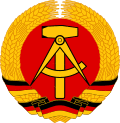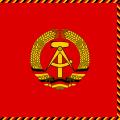| State Council of East Germany Staatsrat der DDR | |
|---|---|
 Emblem | |
 Flag of the Chairman of the State Council | |
State Council Building, East Berlin | |
| Status | dissolved |
| Appointer | Volkskammer |
| Term length | 5 years |
| Constituting instrument | Constitution of East Germany |
| Precursor | President of the German Democratic Republic |
| Formation | 12 September 1960 |
| Abolished | 5 April 1990 |
The State Council of East Germany (German: Staatsrat der DDR) was the collective head of state of the German Democratic Republic (East Germany) from 1960 to 1990.[1]
Origins
When the German Democratic Republic was founded in October 1949, its constitution in its formal structure resembled a bourgeois, federalist democratic system in order to portray the GDR as the legitimate continuation of the prewar Weimar Republic in opposition to the separatist Federal Republic. One of the "bourgeois" features of the constitution (in Article 66) was the office of President, which was filled by Wilhelm Pieck, formerly the leader of the eastern branch of the Communist Party of Germany and now one of the two chairmen of the Socialist Unity Party.
However, from the start the East German government was completely controlled by the SED, and over time its actual power structure grew closer to the model of the Soviet Union. When Pieck died on 7 September 1960, the SED opted against electing a successor, instead opting for a Soviet-style collective head of state. The constitution was amended on 12 September 1960 by the Law concerning the formation of the State Council, which created a collective body in place of the presidency. The same constitutional amendment also acknowledged the role of the recently formed National Defense Council (Nationaler Verteidigungsrat) in GDR defense policy. The State Council remained virtually unchanged in the 1968 constitution, as amended in 1974.
Election
The State Council was elected by the People's Chamber, the East German parliament. Its term was originally four years, but was later changed to five years.
The body consisted of a chairman, several deputy chairmen (usually six), further members (usually sixteen) and a secretary. Members were taken from the political parties and mass organizations affiliated to the SED-controlled National Front. Occasionally an otherwise prominent citizen was also included. Outside of East Germany, the chairman's post was reckoned as being equivalent to that of president.
On paper, the Chairman of the State Council was the second-highest ranking state official in East Germany, behind only the Chairman of the Council of Ministers. In practice, however, the chairmanship was occupied by the leader of the SED for all but a few years of its existence. The sole exceptions were the period of transition from the leadership of Walter Ulbricht to Erich Honecker from 1971 to 1976 and the immediate aftermath of the SED's collapse in 1989. The leaders of the smaller parties in the National Front served as deputy chairmen on the council.
Functions and development
Functions of the State council included
- to call elections to the People's Chamber and other parliamentary bodies
- to appoint members to the National Defense Council
- to grant pardon, amnesty and reprieves
- to ratify international treaties
- to grant diplomatic accreditation
- to grant decorations and awards
- to sponsor families with many children
Originally, the State Council also could issue statutory decrees and legally-binding interpretations of the constitution and laws. The diplomatic role of head of state solely rested with the chairman. Both the body's legislative powers and the chairman's special diplomatic status were formally abolished in 1974.
Though the Council formally exercised its functions collectively, it was dominated by its chairman, especially if the chairman was also leader of the SED. In contrast, the predecessor post of president was a relatively weak position. However, the body had some importance as an advisory and decision-making body under Walter Ulbricht. When Ulbricht lost power in the early 1970s, the body was reduced to a ceremonial role. The 1974 amendments reflected this development; when Honecker became chairman in 1976, he derived most of his real power from his party post.
The secretariat of the State Council was of some practical importance as its approximately 200 employees since 1961 dealt with citizens' petitions. Authorities in government and economics were obliged to cooperate with the secretariat on this.
Abolition

When Egon Krenz, Honecker's successor as leader of the SED, failed in his bid to preserve Communist rule in East Germany, he resigned from his offices in party and government, including his chairmanship of the State Council. To mark the end of the SED's monopoly on power, LDPD leader Manfred Gerlach was elected chairman. However, the body ceased to be of political importance and merely oversaw the transition to the parliamentary elections of March 1990.
The new People's Chamber, the first that emerged from free elections, met for the first time on 5 April 1990. Among its first measures was an amendment to the constitution abolishing the State Council. As provided in the constitution, the president of the People's Chamber, Sabine Bergmann-Pohl, served as interim head of state until reunification with West Germany on 3 October.
List of members
| Chairman | Political Party | Took Office | Left Office |
|---|---|---|---|
| Walter Ulbricht | SED | 12 September 1960 | 1 August 1973 |
| State Council elected 12 September 1960
| |||
| State Council elected 13 November 1963
| |||
| State Council elected 13 July 1967
| |||
| State Council elected 26 November 1971
| |||
| Willi Stoph | SED | 3 October 1973 | 29 October 1976 |
| Composition see above. | |||
| Erich Honecker | SED | 29 October 1976 | 24 October 1989 |
| State Council elected 29 October 1976
| |||
| State Council elected 25 June 1981
| |||
| State Council elected 16 June 1986
| |||
| Egon Krenz | SED | 24 October 1989 | 6 December 1989 |
| Composition see above. | |||
| Manfred Gerlach | LDPD | 6 December 1989 | 5 April 1990 |
| Composition see above. | |||
References
- ^ Cook, Bernard A. (2001). Europe Since 1945: An Encyclopedia. Taylor & Francis. p. 1284. ISBN 9780815340584.

